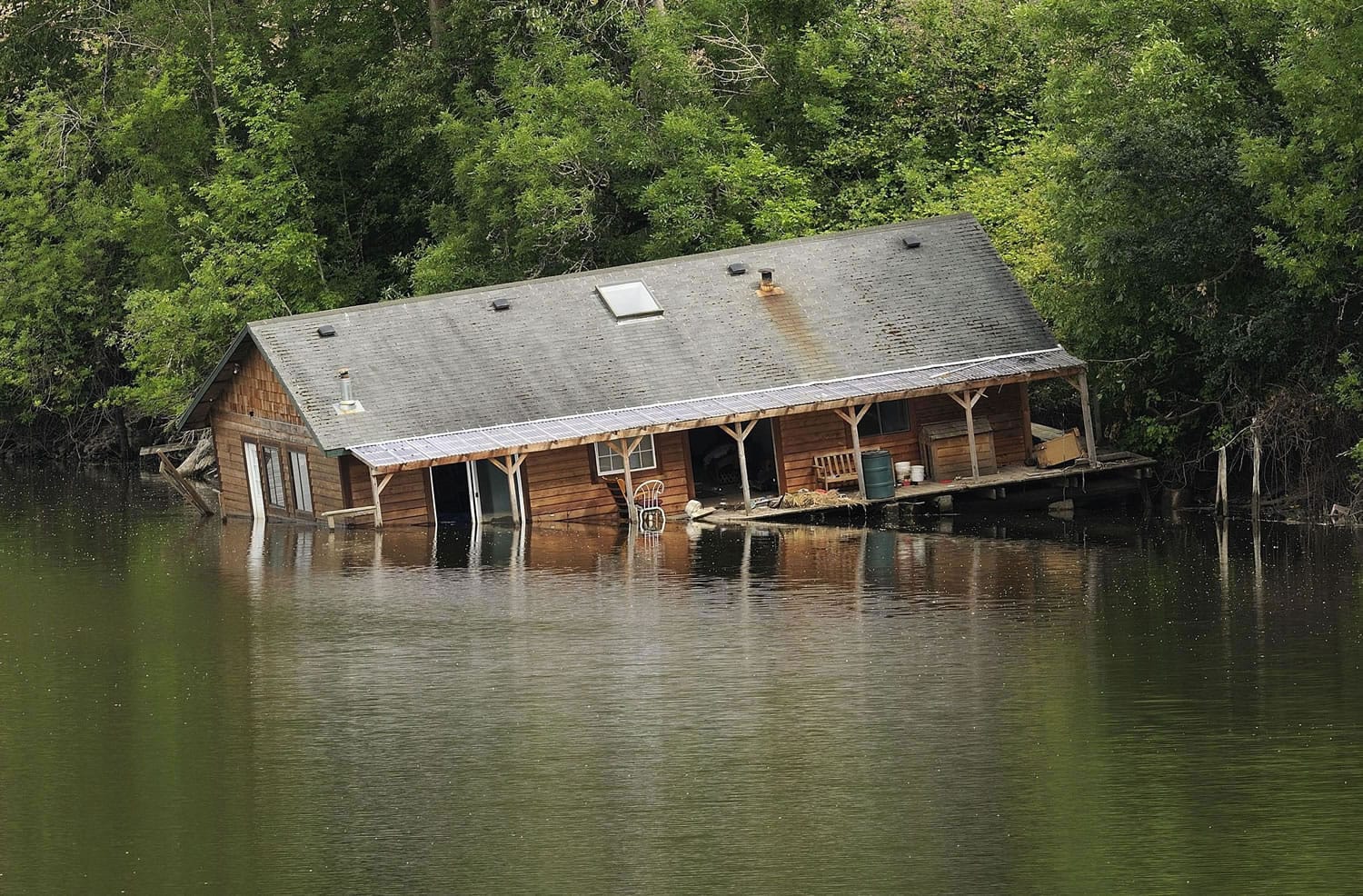Eight months after an abandoned houseboat was left illegally moored along Lake River near Ridgefield, state officials still have no plans to remove it anytime soon. That’s despite receiving a bid to take care of it more than two months ago.
The reason? Too big of a price tag for a situation that’s not considered an environmental threat, according to Bryan Flint, communications director for the state Department of Natural Resources.
“Basically, we’re not taking any action at this point,” Flint said.
So the derelict house — damaged, looted and partially submerged in the river — waits. And waits. As does the 32-foot cruiser vessel that towed it there, then sank to the bottom of the river in March.
In early August, Seattle-based Ballard Diving & Salvage gave DNR three options and cost estimates for taking care of the wayward house. Crews could attempt to level and stabilize the home for about $34,000. They could stabilize it and tow it to nearby McCuddy’s Ridgefield Marina for more than $43,000. Or they could demolish and remove it for almost $60,000.
Any cost to remove the house would come out of DNR’s operating budget, Flint said. An abandoned house doesn’t fall under the agency’s Derelict Vessel Removal Program, and can’t use that money. Rather than find it elsewhere, officials decided to take a “wait-and-see” approach in the event that another option becomes available, he said. Neither the house nor the sunken vessel is considered environmental or navigational hazards, Flint said, and thus aren’t a high priority. Both sit in state-owned aquatic land near the Ridgefield National Wildlife Refuge.
The house appears to again expose a gray area in official responses to derelict vessels. Huge, high-risk cases such as the $20 million Davy Crockett barge cleanup on the Columbia River prompt an immediate, swift response from federal and state authorities. Smaller mishaps with no apparent ecological risk, like the Ridgefield houseboat, fall through the cracks.
“And it’s a big crack,” Flint said.
Avoiding eviction
The house previously had been moored at McCuddy’s Ridgefield Marina before owner Lance Balderree became embroiled in a dispute over unpaid moorage fees. On the verge of eviction, Balderree towed the home just upstream and left it there.
The U.S. Coast Guard initially stepped in and minimized the threat of oil leaking from the cruiser vessel before it sank. The state Department of Ecology also sent representatives to make sure the house posed no threat, said spokeswoman Kim Schmanke.
But once the house and vessel were not considered an environmental risk, both sat in limbo. The Clark County Sheriff’s Office lacked the equipment to take care of it. And the Ecology Department stepped back according to policy, Schmanke said.
“Once we’ve addressed the pollution threat that we’re legally authorized to deal with, we then step into a coordinating mode,” Schmanke said.
Schmanke said she recognizes that there may be some public frustration at the situation, or a perception that nothing is being done about it. In this case, the ecology department simply doesn’t have jurisdiction, she said.
“It’s not that we don’t care or are not responsive,” Schmanke said. “We’ve done what we can do.”
The Ridgefield marina had considered taking in the house if it could be towed back there. That’s still a possibility, but the structure may not hold up well after having sat partially submerged for so long, Matt McCuddy of McCuddy’s marinas said this week.
The house angled lower into the water as the river level dropped over the summer and early fall. This week, the roof on one side of the house nearly touched the river. DNR may wait to see if rising water changes the orientation and makes it an easier and cheaper fix, Flint said.
Being able to stabilize or tow the house would depend on its structural integrity, according to Ballard Diving & Salvage’s bid. Either would have been much easier early on, McCuddy said.
“It’s probably totaled now,” he said. “It’s probably going to cost the government a whole lot more now than it would have.”
Eric Florip: 360-735-4541 or eric.florip@columbian.com.




